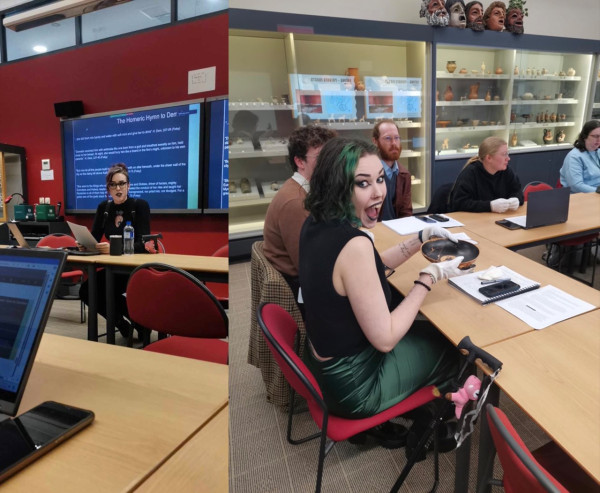Covid-19 normalised hybrid learning for university students around Aotearoa. Four years after the height of the pandemic, not all of them want to go back to attending classes in person.
While the Government recently cracked down on public servants working from home, many university students can still watch lectures and attend tutorials online.
It raises the question: do students need to attend classes in person anymore?
Advocating for in-person attendance as a tutor
Josh Donaldson, 22, has been a university tutor for almost three years and strongly believes students should attend tutorials in person because they allow students to properly socialise and form friendships.
Those friendships make getting through coursework and staying on top of deadlines easier, the Master’s student says.

Josh Donaldson, 22, is a Master’s student and a university tutor. Image: supplied.
“It develops you more as a person if you're actively talking with other people about the subject that you're doing, especially if you want to do higher level things like masters or postgraduate.”
He says students should make the most of campus and its facilities because “you're paying for the upkeep of the university campus so if you're not going, it's money that's essentially going to waste”.
Josh says it’s hard to connect with students on Zoom tutorials, especially when there’s 20 students online who are silent with their cameras off and he feels like he’s talking to himself.
“I can't look at people's faces and tell ‘oh, this person gets it’ or ‘this person's really confused’ because there's so many little micro signals and mannerisms that I get in person.”
“Either I'm getting through to everyone and no one's got any questions or everyone's got a question but they're too afraid to ask, and it kind of sucks that way.”
Lectures, on the other hand, might be better understood on a recording if they are very technical and require students to pause them to digest information properly, Josh says.
“But if it's a very interactive lecture, I think you miss out on a lot by not being there in person.”
He says the only way he was able to get hired as a tutor was by attending lectures in-person and developing relationships with lecturers, who rejected his previous applications when they didn’t personally know him.
Studying from home because work clashes with class
Iain, who is keeping his last name private to protect his academic career, is a 21-year-old criminology and anthropology student who hasn’t attended a class in person since June this year.
He says he and his friends aren’t able to go to classes because they work full-time or because the shifts they’re given clash with lectures.
“It's hard when you see your friends struggling to do school work because lecturers aren't accommodating of just how hard it is to be a student at the moment with little income.
“I don't think anyone wants to be working while studying and I certainly don't want to be. But a lot of people are just left without a choice.”
Even when work schedules don’t clash with classes, Iain says students might still only tune in online because they’re burnt out — not because they’re lazy.
For example, if a student works full time on the weekend and has the week free for classes, because they have lost their weekend and haven’t rested, they’re too tired to show up to class, he says.
“If anything, it's a real privilege to be able to get to class in person.”
Iain watches his lectures late at night which he says can be “quite isolating”.
He says he’s not part of any study groups for any of his classes and he’s only made friends through sport.
Iain says tutorials are better if they’re attended in person but he doesn’t see a future where he starts physically going to university because it gives him imposter syndrome.
“Seeing groups of people all getting along… It does kind of feel like ‘oh, do I really belong here, kind of thing? If I don't have these connections?’”
“It's just easier to study at home because I'm in the comfort of my own home.”
Attending classes in person and online as a disabled student
Tam Maxwell, 22, is about to start their Master’s degree in classical studies and has been a university tutor for around six months.
A host of physical and mental disabilities have limited, and sometimes prevented, their ability to physically come to campus.

Tam Maxwell, 22, is a Master’s student and university tutor. Images: supplied.
Tam has fibromyalgia, endometriosis, Ehlers-Danlos syndrome, postural orthostatic tachycardia syndrome and chronic fatigue syndrome.
They also have depression, complex anxiety, complex PTSD, ADHD and autism.
In Tam’s experience “going in person is how you're going to get the most out of your university experience but it's not a necessity”.
Tam went to classes in person as much as possible in their first year of university but had to take six months off in their second year because their disabilities worsened.
In their third year, they took extra classes to make up for lost time and say they were able to do so because all classes were recorded and some were on Zoom.
Tam credits their overall A-average grade to hybrid learning but admits it held them back from making friends in classes.
“If a student is like me and is really driven and really loves uni… Then going in person isn't going to change the outcome of their grades.”
In-person attendance has benefitted them in other ways.
While Tam was doing their Honours degree, they physically attended most of their seminars which made collaboration easier and allowed them to experience their lecturers’ passion and enthusiasm in person.
Because they had fostered good relationships with lecturers by coming in person, it was easier to work with them to navigate the few classes they missed because of their disabilities.
As a tutor, Tam formed a positive connection with a student who attended their Zoom tutorials but felt anxious about speaking in them.
They came to an agreement that when Tam would divide the class into break-out rooms for group discussions, the student was allowed to discuss the material with Tam because talking to them was less anxiety-inducing.
“It's actually not that hard to be accommodating to your students.
“Yes, in person is always preferred. That would be great if we could all come in person every day. But also the hybrid learning can be just as beneficial, and you can still form those relationships.”
Expert says lecturers should improve how they teach hybrid classes
Cheryl Brown, a professor in the education faculty at the University of Canterbury, has expertise in digital education and is a proponent of hybrid learning.
Brown says lecturers need to better cater to their invisible audience online, especially those watching lectures in the future, because she doesn’t think in-person attendance will ever return to pre-Covid levels.
She also suggests lecturers shouldn’t feel like they need to talk for the entire lecture and can instead give online students tasks and responsibilities to engage them in their learning.
“We need to be thinking about the diversity of students that are engaging in our course and how can we adapt or give options and choices for students to pick and choose and work through things in the way that suits them?”
Brown says the height of the pandemic taught universities a lot about catering to digital audiences but she feels like progress has been lost in recent years.
“We're not short on ideas. What we're short on is the confidence for people to change the traditional approach to teaching and learning and universities.”
More stories:
‘A long time coming’: Futsal Ferns qualify for first-ever Women’s World Cup
The FIFA Futsal Women’s World Cup debuts next year – and NZ squad is one of 16 teams competing.
NZers are getting teeth removed because it's cheaper than fixing them
New report shows how much the dental care system is costing Aotearoa
A look inside Wellington's new $50 million facility for people in need
Wellington City Mission’s new facility has a free supermarket, healthcare, accommodation and more.